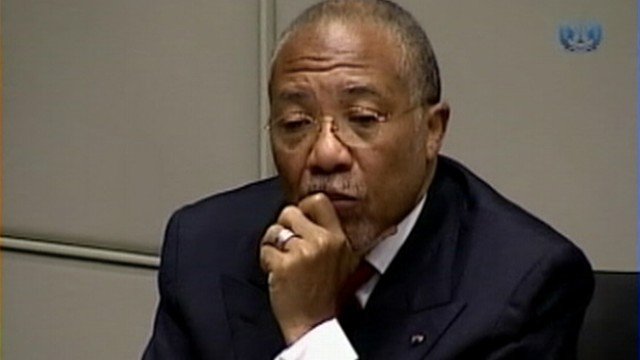
Charles Taylor, the former president of Liberia, has been sentenced to 50 years in jail by a UN-backed war crimes court.
Last month Charles Taylor was found guilty of aiding and abetting rebels in Sierra Leone during the 1991-2002 civil war.
Special Court for Sierra Leone judges said the sentence reflected his status as head of state at the time and his betrayal of public trust.
Charles Taylor, 64, insists he is innocent and is likely to appeal against the sentence, correspondents say.
The appeal process could last up to six months.
During the sentencing, Judge Richard Lussick said the crimes in Sierra Leone were some of the most heinous in human history.
The prosecution had wanted an 80-year prison term, but the judge said that would have been excessive – taking into account the limited scope of his involvement in planning operations in Sierra Leone.
However, Judge Lussick said in return for a constant flow of diamonds, Charles Taylor provided arms and logistical and moral support to the Revolutionary United Front rebels – prolonging the conflict and the suffering of the people of Sierra Leone.
“While Mr. Taylor never set foot in Sierra Leone, his heavy footprint is there,” the judge said.

In its landmark ruling in April, the court found Charles Taylor guilty on 11 counts, relating to atrocities that included rape and murder.
He became the first former head of state to be convicted of war crimes by an international court since the Nuremburg trials of Nazis after World War II.
In response, Charles Taylor accused the prosecution of paying and threatening witnesses in his war crimes trial.
He also told the judges to consider his age when making their decision, saying he was “no threat to society”.
But the trial chamber said given his social background, “rehabilitation” was not likely.
The fact that he had not expressed remorse also affected the sentence, the judge said.
He had condemned atrocities across the world, and had the “deepest sympathy” for victims in Sierra Leone, but stopped short of apologizing for his part in the conflict.
The judges agreed with the prosecutors that Charles Taylor’s age, or the fact that he has a family, should have no impact on the sentence.
In written filings, prosecutors said a sentence of 80 years would reflect the severity of the crimes and the central role that Taylor had in facilitating them.
“The purposely cruel and savage crimes committed included public executions and amputations of civilians, the display of decapitated heads at checkpoints… public rapes of women and girls, and people burned alive in their homes,” wrote prosecutor Brenda Hollis.
But defense lawyers said the recommended sentence was “manifestly disproportionate and excessive”, and that Taylor had only been found guilty of an indirect role – aiding the rebels, rather than leading them.
They said their client should not be made to shoulder the blame alone for what happened in Sierra Leone’s war.
The court should not support “attempts by the prosecution to provide the Sierra Leoneans with this external bogey man upon whom can be heaped the collective guilt of a nation for its predominantly self-inflicted wounds”, his lawyers wrote.
During the Sierra Leone civil war, Charles Taylor supported RUF rebels who killed tens of thousands of people.
The war crimes included murder, rape, the use of child soldiers and the amputation of limbs.
Taylor was accused of channelling weapons to them in return for “blood diamonds” but the judge said the prosecution had failed to prove their case that he had given orders to the RUF.
The case is being heard in The Hague for fear that a trial in Sierra Leone could destabilize the region. The Dutch government only agreed if Taylor would serve any sentence in another country, so he will serve any prison term in the UK.